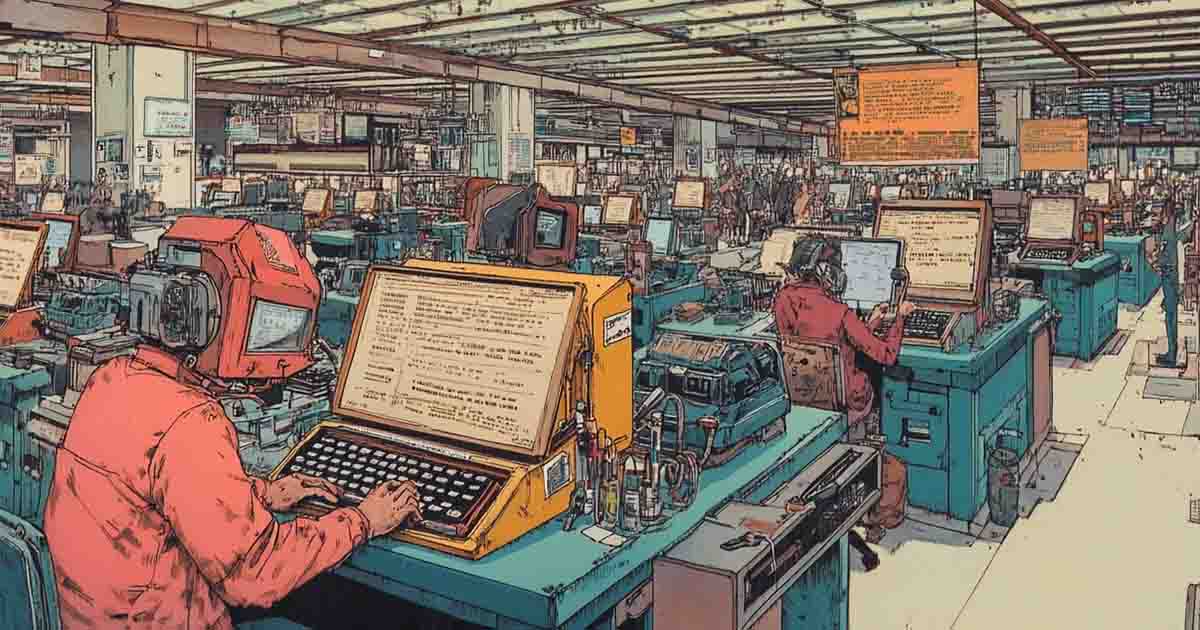AI Writing Will Make You An Editor
As AI takes over content generation, writers are being promoted to editors. Learn how this shift mirrors traditional newsrooms and requires new editorial skills.

Using generative AI to create article ideas, outlines, and even drafts has promoted content creators to the role of editor.
I had my first paying journalism job at the Wheeling News-Register in 1996. This West Virginia newsroom was old enough that it had mainframe computers — sort of like glorified typewriters with monotone screens.
Beat reporters earned peanuts, while editors raked in a living wage. I wanted to use the News-Register as a stepping stone to a larger paper or get promoted to editor.
Circa 2024, AI is moving writers from content generators to content curators and editors. Instead of being the newsroom reporter racing to meet deadlines, today's content creators find themselves in the editor's chair, polishing AI-generated drafts into publication-worthy pieces.
Gone are the days when writers stared at blank pages, waiting for inspiration to strike.
The AI Writing Revolution
AI systems can generate human-like text at a scale and speed that would have seemed impossible five years ago — you know this. But like any revolutionary technology, AI writing tools have remarkable capabilities and notable limitations that shape how writers can best use them.
AI excels at rapid content generation. Give GPT, Claude, or your favorite AI a topic, and it can instantly produce outlines, generate multiple angles on a story, or create complete first drafts.
AI's speed is particularly valuable for brainstorming sessions, where it can suggest dozens of approaches in seconds.
The technology also shows impressive versatility, readily adapting its writing style from casual blog posts to formal academic papers.
However, AI's limitations become apparent in crucial areas that professional writers have long mastered. Fact-checking remains a critical weakness since AI can confidently present incorrect information or "hallucinate" non-existent sources.
Generative AI struggles with nuance and context, sometimes missing subtle but important distinctions that human writers naturally grasp.
Finally, AI-generated content often lacks a distinctive voice, producing text that can feel generic without human refinement.
What's emerging is a new collaborative workflow that plays to both human and AI strengths.
AI generates initial ideas and rough drafts. Content creators then step into an editorial role, fact-checking claims, adjusting tone, and adding the personal insights and authentic voice readers value.
This hybrid approach combines AI's speed and scalability with human creativity and judgment, just like a traditional newsroom's reporter-editor relationship, but compressed into a single person's workflow.
The Writer's Evolution
Just as newspapers once promoted talented reporters to the editor's desk, AI is elevating writers to a more strategic role. However, this promotion comes with new responsibilities that require an evolved skill set.
Modern writers —content creators like bloggers and newsletter authors— must master prompt engineering or the art of instructing AI systems, if you will. Like a managing editor assigning stories to reporters, effective prompting requires clear direction, specific parameters, and an understanding of the "reporter's" capabilities.
A vague assignment yields vague copy, whether you're working with a rookie journalist or an AI.
Content creators must also develop sharp editorial judgment for AI outputs. This means quickly assessing whether a generated draft has potential or needs to be scrapped. This skill is familiar to any news desk editor who has sent stories back for rewrites. The key difference? AI doesn't get defensive about criticism or need a morale boost after a harsh edit.
Fact-checking has become more crucial than ever. While traditional editors can trust their reporters' basic facts, AI-generated content requires vigilant verification. Writers must develop robust fact-checking processes and be skeptical of AI-produced information.
Perhaps the most vital editorial skill is voice refinement. AI can mimic writing styles but struggles to create authentic, consistent voices that build audience loyalty.
Bloggers, newsletter authors, and similar content creators must shape AI-generated content to match their brand voice or publication style, much as newspaper editors once maintained their paper's distinctive tone across multiple contributors.
Amid all this change, certain fundamental skills remain essential. Critical thinking, audience awareness, and storytelling instincts are as valuable as ever. The ability to spot a compelling narrative angle — whether generated by humans or machines — still separates excellent content from mediocre output.
So here is the question, "what are you doing to promote yourself to Editor-in-Chief?"